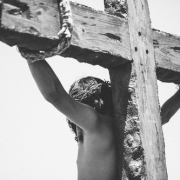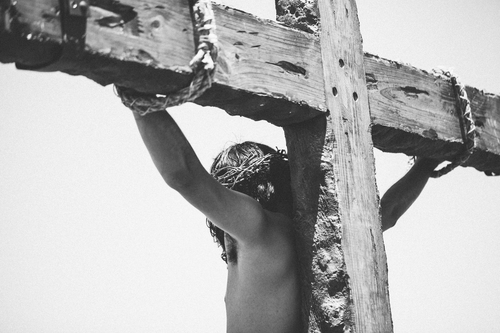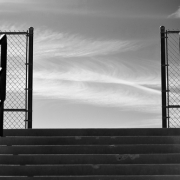Tested by the Devil
Then Jesus was led up by the Spirit into the wilderness to be tempted by the devil. (Matthew 4:1)
At the end of Matthew chapter 3, Jesus identified with sinners by being baptized – even when He didn’t need to be baptized for His own sake. Now, in Matthew 4, the sinless Savior will again identify with sinful humanity, this time in severe temptation. This was a necessary part of His ministry, so He truly was led up by the Spirit into the wilderness.

It was a remarkable contrast between the glory following Jesus’ baptism and the challenge to be tempted by the devil.
– Then, the cool waters of the Jordan; now the barren wilderness.
– Then, the huge crowds; now solitude and silence.
– Then, the Spirit rests like a dove; now the Spirit drives Him into the wilderness.
– Then, the voice of the Father calling Him “Beloved Son”; now the hiss of Satan the tempter.
– Then, anointed; now attacked.
– Then, the water of baptism; now the fire of temptation.
– Then, the heavens opened; now hell seemed to open against the Savior.
Yet it was all necessary and led by the Spirit. Jesus did not need to be tempted to help Him grow. Instead, He endured temptation both so that He could identify with us (Hebrews 2:18 and 4:15), and to demonstrate His own holy, sinless character.
The Holy Spirit cannot tempt us (James 1:13), but the Holy Spirit may lead us to a place where we will be tempted. This is not to prove something to God (who knows all things), but to prove something to us and to the spiritual beings observing us.
Temptation is a certainty for everyone. Yet Jesus’ temptation was more severe. It was more severe because He was tempted directly by the devil himself, while we contend mainly with lesser demons. It was also more severe because there is a sense in which temptation is “relieved” by giving in, and Jesus never did yield. Therefore, He bore levels of temptation we will never know by experience.
This event is commonly called “The Temptation of Jesus.” Yet many commentators believe that isn’t accurate, because the word translated tempted here is better understood as tested. We can say that every temptation is a test, but not every test is a temptation. Here, Jesus was both tested and tempted. He was tested by His long fasting in the wilderness and tempted by Satan’s enticements to do evil.
Dear brother or sister in Jesus Christ, you will be both tempted and tested – and will likely experience these until you graduate to glory. If our Savior endured these for the glory of God, it should not surprise us when we must endure them as well.
As you read on in Matthew 4, you will see how Jesus answered when the devil tested Him. Jesus answered with the power and wisdom of God’s word. When the devil tempts, you may also answer him with the power and wisdom of the Bible!



















